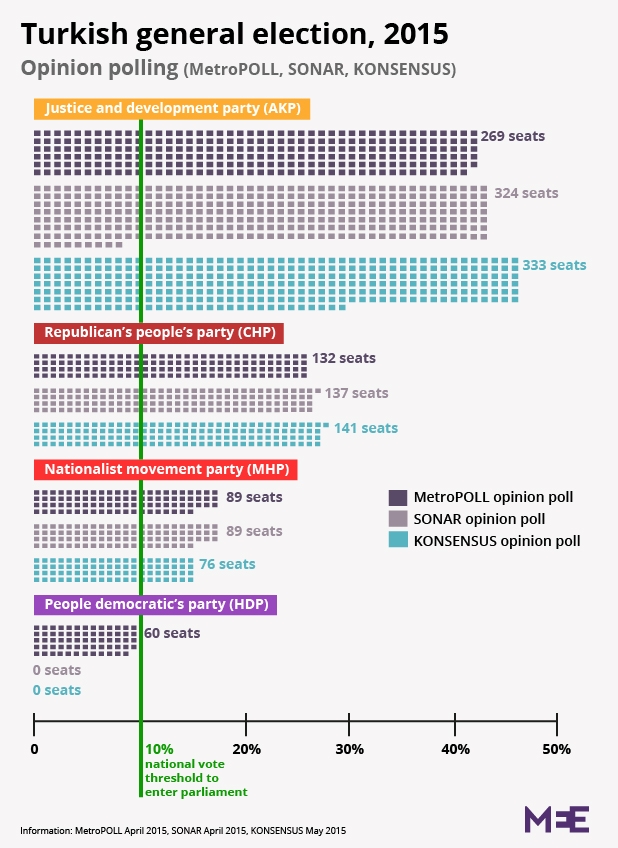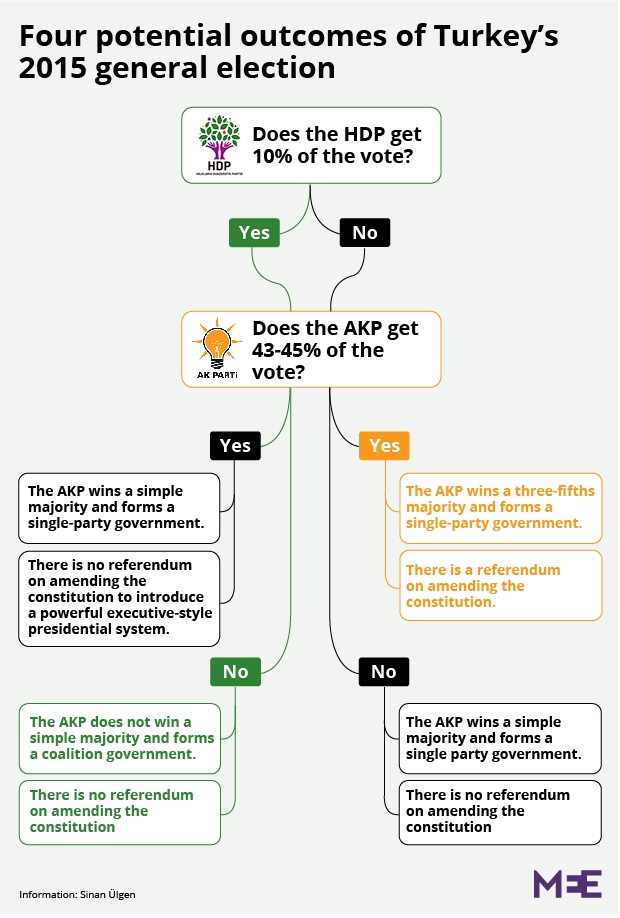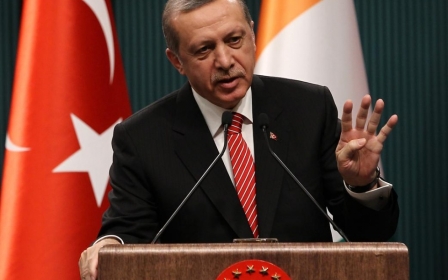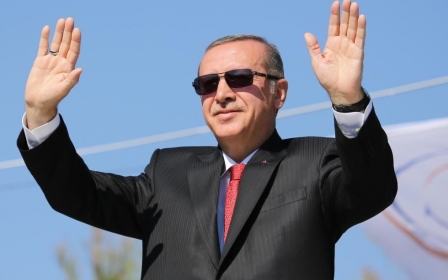ANALYSIS: Four possible outcomes for the Turkish election

The strength of Turkey’s ruling Justice and Development (AKP) party after this Sunday’s parliamentary elections lies in the hands of a brand new pro-Kurdish party.
A big win for the AKP could allow President Recep Tayyip Erdogan to centralise presidential powers and push for the "New Turkey" which he has described over the past year. A poor showing could force the party into a coalition government, a scenario that proved disastrous for the country in the 1990s.
The outcome for the party will have direct ramifications on whether Turkey moves to a presidential system and the possibilities for bringing an end to the struggle between the government and outlawed Kurdistan Workers' Party (PKK) that has seen 40,000 people killed over three decades.
To hold onto the single-party government it has led for 13 years, the AKP – which currently has 312 representatives in the Turkish parliament - needs to secure a simple majority, or 276 out of a 550-seat parliament.
To push through the party’s proposed amendments to the constitution – changes that would strengthen the presidential system - and then put it to a national vote, the AKP needs 330 seats, or a three-fifths majority in the legislature.
Which way the election and AKP’s mandate will swing depends largely on the newly formed pro-Kurdish People’s Democratic Party (HDP). The party has been gaining strength among Kurds as well as secular and liberal voters who like its focus on human and women’s rights, social equality and welfare.
The HDP hopes to pass the 10 percent threshold required to be represented in the 550-seat parliament. Should it surmount that hurdle, the AKP’s ambitions of winning 330 deputies to rewrite the country’s 30-year-old constitution could lie in tatters.
Here are four possible scenarios:
Outcome 1: AKP reaches a three-fifths majority in the elections, while HDP falls short of clearing the 10 percent threshold, forfeiting its chances at representation in parliament.
The votes cast for HDP would be reallocated, with AKP - the main contender in Kurdish areas - being the primary beneficiary.
In this scenario, AKP will have won more than 330 seats in parliament and will be able not only to form a single-party government, but also to hold a constitutional referendum to establish a presidential system in Turkey.
Experts say that this is an unlikely scenario: “AKP will probably fail to reach the three-fifths majority required to pass a self-drafted constitution out of the parliament and onto a plebiscite for national vote,” said Aaron Stein, an associate fellow at the Royal United Security Institute (RUSI).
Outcome 2: HDP falls short of the 10 percent threshold and AKP manages to win a simple majority.
Although seats forfeited by HDP in this scenario would be reallocated to larger parties, allowing AKP to form a single-party government, the seats allocated to AKP will not secure the three-fifths majority needed to introduce a referendum on the constitution.
According to Ceren Kenar, a Turkish journalist and political analyst, this would be the ideal scenario for AKP under the current circumstances.
“AKP is losing votes for sure. Parts of its nationalist constituency will vote for MHP [Nationalist Movement Party] because of the peace process, while many Kurds, previously supporting AKP, have defected after HDP’s Kobani campaign alleging [that] AKP supports IS,” said Kenar, referring to events in October 2014.
For the Kurds however, a disappointment at the polls could spark protests in Turkish provinces in the southeast, with observers highlighting the possibility of popular support shifting from the HDP to more radical elements of the Kurdish movement.
“HDP's failure would gain the PKK more legitimacy in the eyes of many … frustration could turn to violence easily … [and] PKK may be perceived a prominent, legitimate voice of the Kurds as an outcome,” said Mustafa Gurbuz, a policy fellow at the Centre for Global Policy at George Mason University.
Outcome 3: HDP gets more than 10 percent of the vote, allowing it to enter parliament, while AKP secures a simple majority and forms a single-party government.
Although this case would be similar to the Outcome 2 – AKP would not be able to propose a constitutional referendum - it could be a game changer for Turkey’s future.
HDP’s parliamentary inclusion would force the AKP to negotiate with the group for the passage of a new constitution which would strengthen the HDP’s hand in the peace negotiations, Stein said.
And while the party’s forward momentum could be historic in bringing Turkey's Kurdish minority closer to achieving linguistic and cultural rights, this possible outcome has also raised fears amongst certain voters that the HDP will reach an agreement with the AKP for the executive presidency.
But a potential AKP-HDP alliance could be detrimental for the Kurdish party which has relied on its anti-AKP campaign to garner support.
“If HDP passes the threshold and an agreement is reached, that will push the [peace] process forward, but in doing so, HDP would completely destroy the trust of its constituency who voted for it because they thought it would stand up against Erdogan,” explained Stein.
Potential HDP voters are thought to come largely from the country’s Kurdish population, but also from an array of disgruntled groups including Alevis, Gulenists, liberals and former AKP and Republican Peoples' Party (CHP) supporters.
“The pro-Kurdish HDP is being perceived as the last saviour among different groups in Turkey, even those who don’t like Kurds - the nationalists and Gulenists who were against the peace process - are now potentially voting for this party,” said Kenar.
Outcome 4: HDP clears the 10 percent threshold, while AKP does not secure a simple majority forcing it to form a coalition government.
While analysts say this is an unlikely scenario, the pro-Kurdish party will be represented in the parliament.
But the party could be a victim of its own success as AKP will most likely form a coalition with the far-right, nationalist MHP, a move that could throw the precarious peace process between the government and the outlawed PKK aimed at ending a three-decade insurgency that has cost Turkey some 40,000 lives, into jeopardy.
“If a coalition were to be formed, it will be with MHP and one of the concerns of the HDP is that would end the peace process with the Kurds,” explained Stein.
Middle East Eye propose une couverture et une analyse indépendantes et incomparables du Moyen-Orient, de l’Afrique du Nord et d’autres régions du monde. Pour en savoir plus sur la reprise de ce contenu et les frais qui s’appliquent, veuillez remplir ce formulaire [en anglais]. Pour en savoir plus sur MEE, cliquez ici [en anglais].






